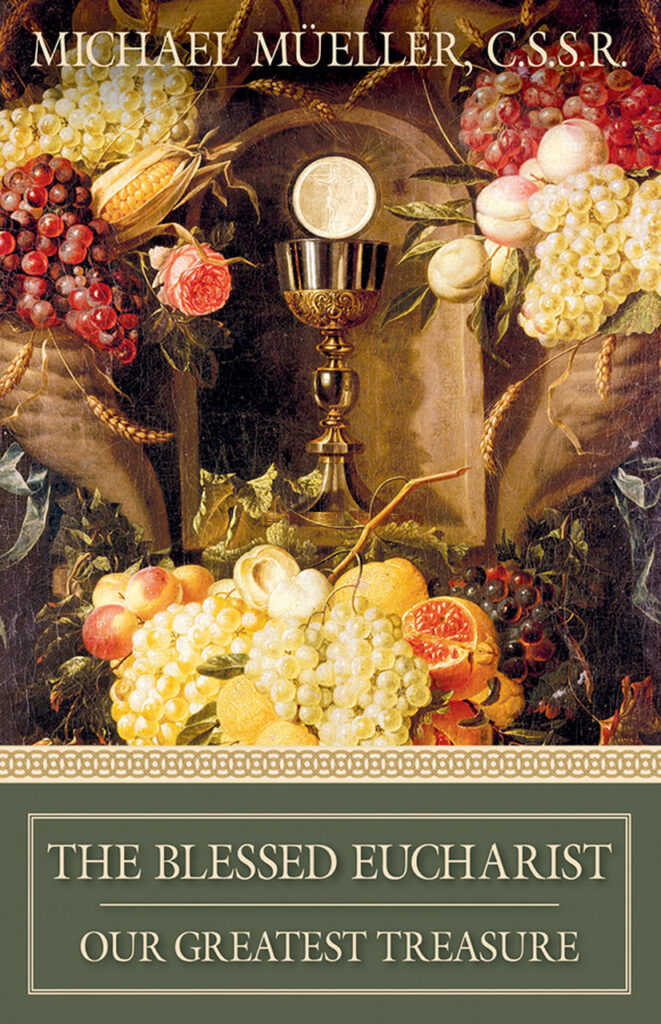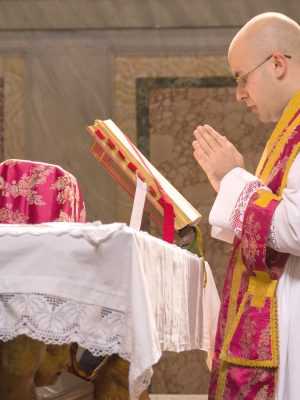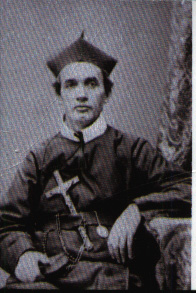You may ask, dear Reader, if Our Lord also ordained the ceremonies of Mass. I answer, “No.” He instituted only the essential arts of the Mass. He left it to His Church to prescribe the rites and ceremonies to be observed in its celebration.
However, most of the ceremonies of Mass are of great antiquity, and many of them are without doubt of Apostolic origin. It is principally for two reasons that the Church has prescribed so many ceremonies in the celebration of Mass.
First, because Mass being the highest act of religious worship, the Church desires that it should be celebrated with a solemnity and reverence corresponding in some degree to the greatness of the sacrifice.
Secondly, because if the various ceremonies of Mass are well understood, they will greatly excite and foster a reverence and spirit of devotion in the hearts of the faithful. They all refer to our Savior’s Passion and death, of which the Mass is arranged in accordance with the awful tragedy of Calvary.
The priest, the representative of Christ, is clad in garments like those in which the Redeemer was attired on the day of His cruel death.
The amice, or white cloth worn around his neck, represents the handkerchief with which Our Lord was blindfolded.
The alb, or long white garment, signifies the white robe which Herod put on our Saviour in mockery.
The cincture or girdle.
The maniple on the left arm.
And the stole passing round the neck and crossed upon the breast, all represent the cords and strings with which Our Lord was bound, and by which He was dragged through the streets of Jerusalem.
The chasuble, worn over all the others, signifies the scarlet robe in which He was arrayed when Pilate showed Him to the people, saying: “Behold the man!”
The altar, with its crucifix, represents Mount Calvary.
The chalice signifies the Saviour’s tomb.
The paten, His tombstone.
And the purifier, with the pall and corporal, the linen cloths in which His Sacred Body was wrapped when it was laid in the tomb.
Thus the ceremonies of Mass evince the deep wisdom of our Holy Mother, the Church, and if one has but a little good will, they will be a powerful means of leading the mind on to the great and inestimable mysteries which the Holy Sacrifice contains. When our Saviour was crucified on Mount Calvary, the sun was darkened, the rocks were rent and the whole earth quaked; the Roman centurion, seeing the things that were done, was greatly afraid and said, “Indeed, this was the Son of God.”
So the mystical renewal of the sufferings of Christ which is made at Mass continually excites emotions of faith and love in those who assist at it with sincere hearts.
Truly, Mass is the most powerful means to foster faith and fervor. For this reason, the devil persuaded Luther to attack this Holy Sacrifice, as the most infallible means of preparing the high road to Protestantism, that is to say, a general apostasy from Christianity.
As soon as God would permit the Mass to be abolished, the gates of Hell would exert a fearful power against the Church and even threaten destruction to the Christian religion. Nevertheless, it is possible to remain indevout and cold, even with so great a means of grace at our command. In the very temple of God, Our Lord found those that sold oxen, sheep and doves, and the changers of money sitting.
The love of the world soon deadens our appreciation of spiritual things. Strive to cherish a tenderness of heart for the greatest and most lovely mystery of our Holy Religion. When you go to Mass, say with St. Francis: “Now, ye worldly affairs and thoughts of business, leave me and remain outside, while I go into the Sanctuary of the Most High to speak to the great Lord of Heaven and earth.”
Be reverent while you are assisting at Mass, and when it is over, leave the church with such sentiments of humility and piety as if coming from the awful scene of the death of Jesus Christ on Mount Calvary. In fine form, go forth to your duties with the same resolution with which you would have gone had you stood with Mary and St. John beneath your Saviour’s Cross: namely, to merit Heaven by fulfilling the obligations of your state of life and by bearing with patience all sufferings, trials, hardships and injuries for the love of Jesus Christ, who loved us to such an excess and whom we shall never be able to thank sufficiently, nor repay His ever-burning love.
This article is taken from a chapter in The Blessed Eucharist Our Greatest Treasure by Fr. Michael Müller which is available from TAN Books.








